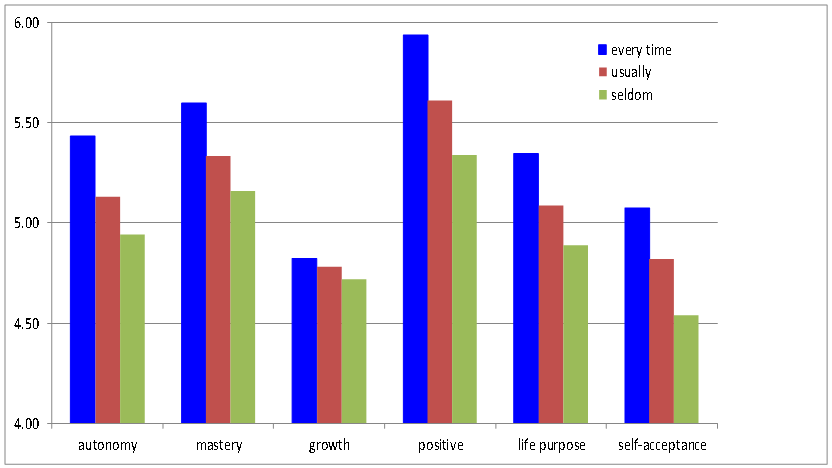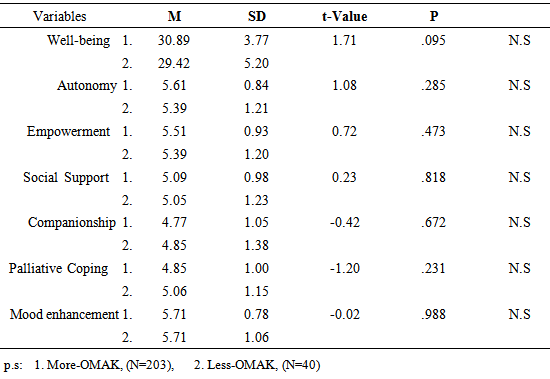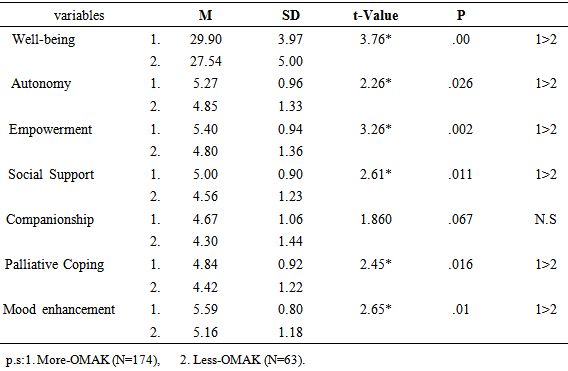-
Paper Information
- Next Paper
- Paper Submission
-
Journal Information
- About This Journal
- Editorial Board
- Current Issue
- Archive
- Author Guidelines
- Contact Us
American Journal of Economics
p-ISSN: 2166-4951 e-ISSN: 2166-496X
2015; 5(5): 484-487
doi:10.5923/j.economics.20150505.07
The Impact of Stress Coping and OMAK on Well-being
Yu Shih Cheng
National Yun-Lin University of Science and Technology, Douliu City, Yunlin County, Taiwan, ROC
Correspondence to: Yu Shih Cheng, National Yun-Lin University of Science and Technology, Douliu City, Yunlin County, Taiwan, ROC.
| Email: |  |
Copyright © 2015 Scientific & Academic Publishing. All Rights Reserved.
Well-being is everyone’s expectation. However, our life is filled varying stresses such as difficulties of work, interpersonal problem, society, economics, etc. Stress coping has been an important issue for people who living in the modern society. The purpose of this study is exploring the effects of varied coping strategies by leisure activities and OMAK. Observe Merits, Appreciate Kindness (OMAK) is a thinking process which considers things always positively. It was popular existing in the society of Confucian’s culture. The effects of OMAK act as cognitive transferring when you encounter a challenge or depressive things. We sampled subjects from Yun-lincounty, Taiwan. The instrument of assessing well-being was revised from Ryff’s (1989) Scales of Psychological Well-being. The stress coping scale was revised from the concept of Iwasaki’s (2000) Hierarchical dimensions of leisure stress coping as well as our edited OMAK scale. 919 participators were effective by whom including above 31 occupations. The results were as follow: there were 94.5% people’s responses with stress in daily life subjectively. While cumulating their stress events to form a criterion, only 42.1% were estimated with lower stress, nevertheless, 57.9% were higher stress objectively. The comprehension of stress through assessing oneself subjectively and computing life stress events objectively was different significantly (χ2 = 28.07, df = 4, P< .00). The leisure stress coping (LSC) and OMAK have significant positive correlations with well-being. We distinguished participators into two clusters: Lower stress and Higher stress in which were depending on their objectively assessment of life stress events. We found both the LSC and OMAK dealing with coping strategies effectively in extent of stress being higher or not.More-OMAK group has significant different on well-being than those of Less-OMAK group while their objective stress criterion is high. In the lower stress cluster, there was not different on well-being between More- and Less- OMAK group. The present study suggests that LSC and OMAK has similar mechanism on stress coping. Especially, the leisure empowerment, social support, and OMAK are important variables in the future research.
Keywords: Leisure Stress Coping, OMAK, Well-being, Cognitive Transferring
Cite this paper: Yu Shih Cheng, The Impact of Stress Coping and OMAK on Well-being, American Journal of Economics, Vol. 5 No. 5, 2015, pp. 484-487. doi: 10.5923/j.economics.20150505.07.
1. Introduction
- Living in the modern world, people meet stress avoidlessly. The source of stress may be coming from every aspect of life such as competitions of work, violence, problem of families, environment, politics, etc. Nevertheless, seeking pleasure and avoiding pain is human’s innate tendency. People know how to treat their unpleasurable situation and make themselves be happy. However, the different stress coping strategies will have varying effects. The most harsh event when befalling on people, as death of families, divorce, and lay off, will disrupt people’s normal life even their health. Fortunately, these crises occur with lower probability. We face middle stress usually. How to manage our used stress effectively is the determination of sustaining daily life well-being.H1: The sense of objective stress is consist with the subjective appraisal for daily life stress. The more objective stress, the more subjective stress is.Among various types of coping resources and strategies, leisure stress coping might be popular and convenient. Leisure can be an important means of helping people to dealwith stress and maintain their health. Iwasaki and Mannell [4] proposed Hierarchical Dimensions of Leisure Stress Coping to explain how people release their stress with different ways. The dimensions proposed are based on a integrative review of social psychological research and leisure research on stress and coping. The first level includes two dimensions: leisure coping beliefs and leisure coping strategy. The second level of leisure beliefs includes two dimensions: leisure autonomy and leisure friendship. Under leisure autonomy there are third level variable: self-determination disposition and empowerment. The leisure friendship has four variables: emotional support, esteem support, tangible aid, informational support. In the first level, the other dimension leisure coping strategies has three second level variables: leisure companionship, leisure palliative coping, leisure mood enhancement.The distinction between leisure beliefs and leisure coping strategies is useful for effectively predicting and explaining how leisure helps people coping with stress. People are more likely to display coping actions consistent with their personality or dispositions. One may choose taking a vacation to reduce stress or doing an aerobic exercise after office hour depends on the situational influence be weaker or stronger. No matter what style of leisure activity people do, leisure is an effective instrument for coping stress. The present study has an assumption as follow:H2: There is positive correlation between leisure coping stress and well-being significantly. The more people know how leisure coping stress is, the more well-being they are. Although leisure stress coping helps people to be well-being, people still have stress while working on duty. Individual have to stop working then they would have leisure time to release stress. Employees must learn to pay patience to every encounter while clients complained about products or service. Someone would serve their job as emotional labor because he/she endures clients’ irrational requirement. Even the client is always correct, but employee is depressive at that moment. Thus, the leisure stress coping could not help at once.Ellis [1] claimed that cognitive appraisal of an event determines the emotional response to it. The emotional responses to irrational cognitions can be changed if you are with more accurate and realistic appraisals of themselves and their experiences. In other words, problems were not what they could be. The emotion of problem solving depends on the extent of your thinking about them.Observe merits and appreciate kindness (OMAK) is seen in the traditional Confucian culture rather than a new theory. In the collective based society, people would not tell the truth in which their friend had made acarelessmistake. However, we should not forgive ourselves while making a little fault on the job. This situation makes us feel bad. The fault is seen as a stressor in our daily life and makes us unpleasurable. Watching at our faults seriously, we would misunderstand the fact if we could review it calmly. OMAK is a cognition transferring method to release our stress. The events make one depressed will not make the others have the same feeling. Lyddon[5] claimed that humans-as self-organizing, developing systems; that it does not emotional or create their personal and social realities. Event is neutral but explained towards fine or poor. OMAK changes our thinking positively about sources of stress. Ellis [2] argued that people suffered from their obsessive disturbances. They consider things which happening above their expectation as a panic consequence. In other words, people construct irrationally from a reality and then scare it with destructive emotions. OMAK help people to see the grim realities of their environment are partly their own constructions, and while seeing the merits behind, they would change the emotions at once.H3: There is a significant correlation between OMAK and Well-being.
2. Method
- The present study chooses sixteen cities in Yun-Lin County, Taiwan. These cities have population above twenty thousand that distributed on Yun-Lin County widely. One hundred subjects were sampled randomly in these cities by researcher. One thousand three hundred and fifty questionnaires were posted or delivered by research assistants. The survey date was from October to December 2014.The instrument was modified from literatures. Well-being scale was translated from The Ryff’s Scale of Psychological Well-being (Ryff [6]; Springer & Hauser[7]). Ryff’s Scale has six dimensions as Autonomy, Environment Mastery, Personal Growth, Positive Relations With Others, Purpose in Life, Self-Acceptance. The subjective stress was assessed for one item(Do you feel a lot of stress in your daily life?) the alternative is: always, sometime, not at all. The objective stress was assessed by 25 stressful events which demonstrate different level of stress. The leisure stress coping scale was cited from Iwasaki’s Hierarchical Dimensions of Leisure Stress Coping(Iwasaki [2]; Iwasaki & Mannell [4]). The OMAK scale was edited by researcher. The concept of OMAK is part of Bliss and Wisdom foundation’s Organization Statements. A prior study found three main constructs for OMAK: 1. Observe merits positively(e.g. No matter what it’s a benefit or disaster, I prefer observing the good side of event.), 2. Transfer faults into merits(e.g. I believe that bad situation would teach me something.), 3. Appreciate kindness while falling into an adversity (e.g. Fall down on my way for my dream helps me be stronger.). The OMAK scale has 11 items and had been tested for a good expert validity and reliability. Cronbach’s α = .71~.86.
3. Result
- Subjects were male(60.4%) and female(39.6%), 51.1% were undergraduate, 89% were engaged in service related firms, the mean of age were 38.7(SD= 9.6).919 participators are effective by whom including in more than 31 occupations. Subjects are male(60.4%) and female(39.6%), 51.1% are undergraduate, 89% are engaged in service related firms, the mean of age is 38.7(SD= 9.6).
|
 | Figure 1. The effect of subjective OMAK on Well-being |
|
|
4. Conclusions
- Stressors exist everywhere. The same daily event may be one’s stressor but not the others. Our response to the stress depends on our cognition, attitude, behavior. Thus, our efforts for coping stress are important. Stress coping influenced health. It’s process acts on human mind and physiology as disease does. Iwasaki’s Leisure Stress Coping works on the people living in the modern society. The evidence of this study proposed that objective stress level was different from stressful feeling subjectively. Nevertheless, the leisure stress coping types were adopted by a convenient way. If leisure activities promote to health as the effect of medicine, the OMAK should be the protection for stress coping.The effects of OMAK stress coping works when one is in a serious situation. Oppositely, one is in a casual situation, OMAK may not help coping stress. People with the disposition of More-OMAK will be significant well-being than those with Less-OMAK. In addition, More-OMAK group is significant better in leisure stress coping such as autonomy, empowerment, social support, etc. OMAK emphasizes cognitive transferring while coming up against a harsh situation. As Ellis [2] said that people feel what they had explained. We depressed when we realized the event might constraint us. Observing merits always positively makes one have opportunities to break away from unwilling situation and seeking a chance to overcome it. The OMAK stress coping has a similar process as Leisure Belief. The mechanism of OMAK and Leisure Belief on well-being and stress coping is suggested in the future research.
 Abstract
Abstract Reference
Reference Full-Text PDF
Full-Text PDF Full-text HTML
Full-text HTML

